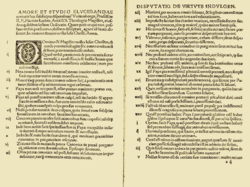
Back Protestantse Hervorming Afrikaans Reformation ALS Reforma protestant AN Cirice Edniwung ANG धर्मसुधार आन्दोलन ANP إصلاح بروتستانتي Arabic تعديل بروتيستانتى ARZ Reforma protestante AST Реформация AV Reformasiya Azerbaijani
| Part of a series on the |
| Reformation |
|---|
 |
| Protestantism |
| Part of a series on |
| Protestantism |
|---|
 |
|
|
| Part of a series on |
| Christianity |
|---|
 |
The Reformation, also known as the Protestant Reformation, the European Reformation,[1] and the Protestant Revolt[2] was time of major theological movement in Western Christianity in 16th-century Europe that posed a religious and political challenge to the papacy and the authority of the Catholic Church. Towards the end of the Renaissance, the Reformation marked the beginning of Protestantism. It is considered one of the events that signified the end of the Middle Ages and the beginning of the early modern period in Europe.[3]
The Reformation is usually dated from the publication of the Ninety-five Theses, authored by Martin Luther in 1517. Prior to Martin Luther and other Protestant Reformers, there were earlier reform movements within Western Christianity. The end of the Reformation era is disputed among modern scholars.
In general, the Reformers argued that salvation in Christianity was a completed status based on faith in Jesus alone and not a process that should also manifest in good works, as in the Catholic view. Protestantism also introduced new ecclesiology. The general points of theological agreement by the different Protestant groups have been more recently summarized as the Three Solas.
The spread of Gutenberg's printing press provided the means for the rapid dissemination of religious materials in the vernacular. The initial movement in Saxony, Germany, diversified, and nearby other reformers such as the Swiss Huldrych Zwingli and the French John Calvin with different theologies arose. The period also saw the rise of non-Catholic denominations with quite different theologies and politics to the Magisterial Reformers (Lutherans, Calvinists, Zwinglians, Anglicans): so-called Radical Reformers such as the various Germanic Anabaptists. The Counter-Reformation comprised the Catholic response to the Reformation, with the Council of Trent clarifying ambiguous or disputed Catholic positions and abuses that had been subject to critique by reformers.[4] The Reformation in Britain took different courses to the Franco-Germanic Protestant Reformations.
The consequent European wars of religion saw the deaths of between seven and seventeen million people.
- ^ Armstrong, Alstair (2002). European Reformation: 1500–1610 (Heinemann Advanced History): 1500–55. Heinemann Educational. ISBN 0-435-32710-0.
- ^ Cahill, E. (1927). "Notes on Christian Sociology. Consequences of Protestant Revolt (Continued)". The Irish Monthly. 55 (643): 29–36. ISSN 2009-2113.
- ^ Davies 1996, p. 291.
- ^ "Counter Reformation". Encyclopædia Britannica Online. 9 October 2023.
© MMXXIII Rich X Search. We shall prevail. All rights reserved. Rich X Search